<Back to Index>
- Admiral of the Fleet of the French Navy Jean Louis Xavier François Darlan, 1881
- Marshal of France Alphonse Pierre Juin, 1888
PAGE SPONSOR
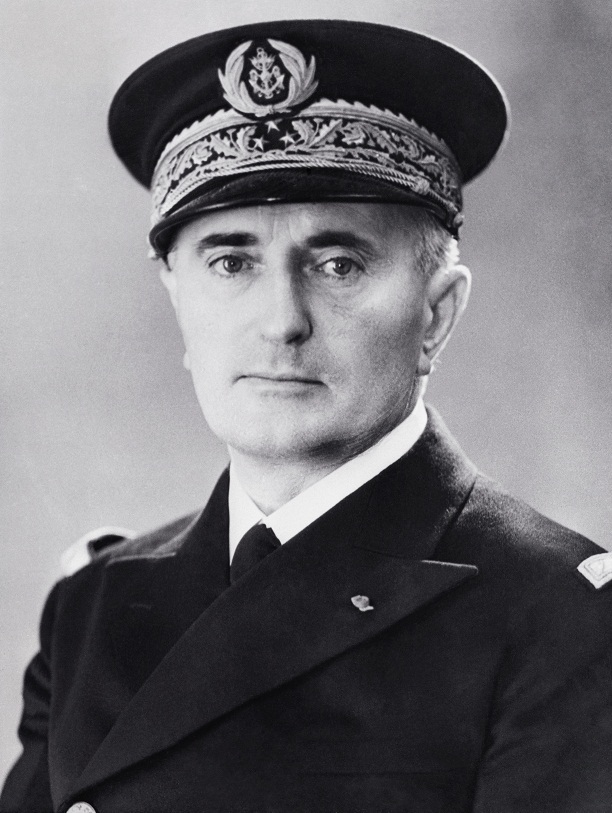
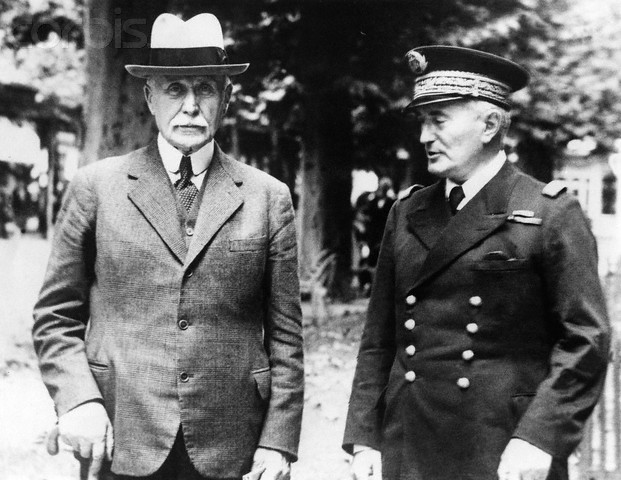
Jean Louis Xavier François Darlan (7 August 1881 – 24 December 1942) was a French naval officer. His great - grandfather was killed at the Battle of Trafalgar. Darlan rose through the French Navy, ultimately becoming Admiral of the Fleet, and was a major figure of the Vichy regime in France during World War II, becoming its deputy leader for a time.
Darlan was born in Nérac, Lot - et - Garonne and graduated from the École Navale in 1902. During World War I, he commanded an artillery battery that took part in the Battle of Verdun. He remained in the French Navy after the war, and was promoted to Rear Admiral in 1929 and Vice Admiral in 1932. Darlan was made an Admiral in 1936 and Chief of Staff from 1 January 1937. In 1939 he was promoted to "Amiral de la flotte," a rank created specifically for him, and given command of the entire French Navy.
When Paris was occupied in June 1940, Darlan was one of those who supported the premier, Marshal Henri Philippe Pétain. Darlan was rewarded by retaining his post as minister of the navy, and he quickly ordered the majority of the fleet to French North Africa. Despite Admiral Darlan's assurances, he refused several invitations from Royal Navy officers to surrender the French Fleet to British control or move them to 'safe' locations in the Caribbean, consequently Churchill feared the French fleet based in Africa would fall into German hands, so he ordered the Royal Navy to attack it at Mers El Kébir on 3 July, killing around 1,300 Frenchmen who only days before had been allies. Darlan's forces bitterly resisted further British attacks on French colonies in Africa, including Senegal and Madagascar.
In February 1941, Darlan replaced Pierre - Étienne Flandin as Pétain's deputy. He was also named minister for the interior, defense and foreign affairs, making Darlan the de facto head
of the Vichy government. In January 1942, Darlan took control of a
number of other government posts. Though Darlan came from a Republican
upbringing and never believed in the National Revolution, he was as much a collaborator as was Pierre Laval, who twice served as prime minister in the Vichy government, and Darlan
promoted a political alliance between French Vichy forces and Nazi Germany through the Paris Protocols.
However, the German government had become suspicious of his opportunism
and malleable loyalties. In April, Darlan was made to surrender the
majority of his responsibilities back to Laval, whom the Nazis
considered more trustworthy. Darlan retained the post of Commander of
the French Armed Forces.
On 7 November 1942, just before the beginning of Operation Torch, Darlan went to Algiers to visit his son, who was hospitalized after a severe attack of polio. Darlan did not know that secret agreements had been made in Cherchell on 23 October between Algerian resistance and General Mark Clark of the combined allied command.
Just past noon on 8 November 1942, 400 poorly armed French partisans attacked the coastal artillery of Sidi Fredj and the French XIX Army Corps of Algiers. About 15 hours later, the partisans had neutralized both forces. Under the command of José Aboulker, Henri d'Astier de la Vigerie, and Colonel Jousse, the insurgent force occupied most of the strategic points of Algiers under the cover of darkness (the General Government, Prefecture, Staff headquarters, telephone exchange, barracks, police headquarters, etc.) and arrested most of the government's military and civil officials. One of the civilian groups, cadets of Ben-Aknoun College under the command of a cadet named Pauphilet, succeeded in arresting Admiral Darlan and General Juin, chief commandant in North Africa. The attack by the French resistance became known as the Putsch of 8 November.
After three days of threats and talks, Clark compelled Darlan and Juin to order French forces to cease hostilities on 10 November 1942, in Oran and 11 November in Morocco – provided Darlan remained head of a French administration. In return, General Eisenhower acquiesced in Darlan’s self - nomination as High Commissioner of France for North and West Africa on 14 November, a move that enraged Charles de Gaulle as well as the local French resistance. On 27 November, the remaining French naval vessels were scuttled at Toulon.
Thinking
he was the prisoner of the Allies, the French government dismissed
Darlan from his positions just before unoccupied France was occupied by
the German army in Case Anton in
order to meet the threat from the Allies in north Africa. Most French
troops in Africa followed Darlan's lead, but certain elements joined the
German forces in Tunisia.
On the afternoon of 24 December 1942, a member of the resistance group led by the monarchist Henri d'Astier de la Vigerie, the 20 year old Fernand Bonnier de La Chapelle entered Darlan's headquarters in Algiers and shot Darlan. Darlan died a few hours later and was replaced as high commissioner by another French flag officer, General Henri Giraud. La Chapelle was executed by firing squad on 26 December.
Darlan was unpopular with the Allies – he was considered pompous, having asked Eisenhower to provide 200 Coldstream Guards and Grenadier Guards as an honor company for the commemoration of Napoleon's victory at Austerlitz. It was said that "no tears were shed" by the British over his death, which removed a potential rival to De Gaulle's leadership of the Free French. "[Harold] Macmillan, with brutal political realism, gave Darlan his ultimate political epitaph: "Once bought, he stayed bought."
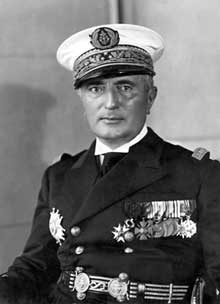
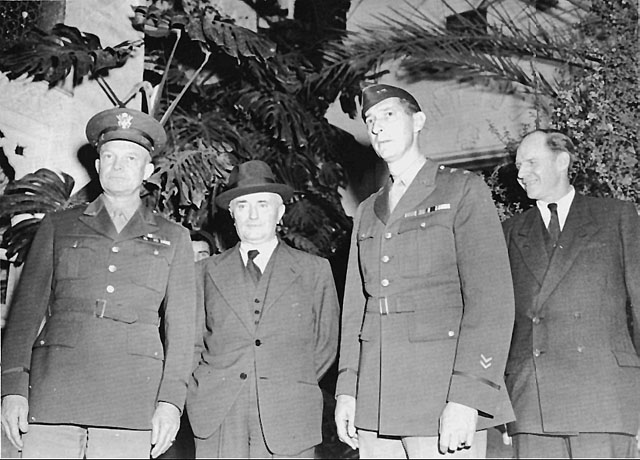
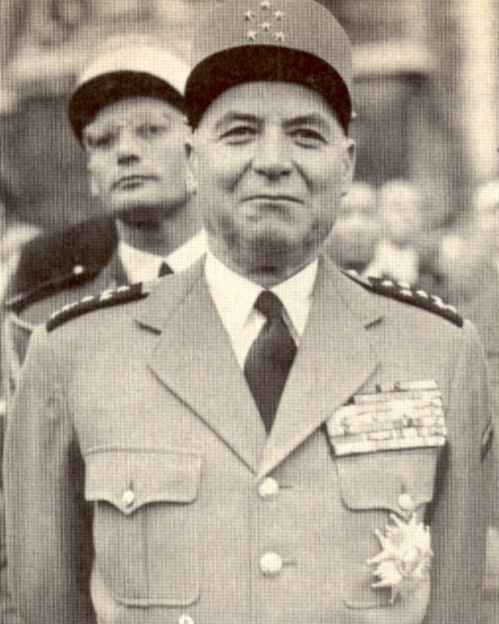
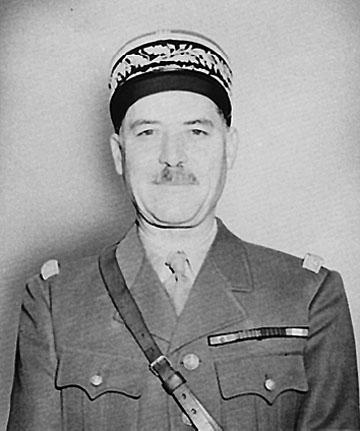
Alphonse Pierre Juin (16 December 1888 – 27 January 1967) was a Marshal of France.
Juin was born at Bône in French Algeria, and enlisted in the French Army, graduating from the École Spéciale Militaire de Saint - Cyr in 1912.
In 1914 he was in Morocco, in command of native troops there. Upon the outbreak of World War I, he was sent to the Western Front in France where he was gravely wounded in 1915. As a result of this wound, he lost the use of his right arm.
After the war, he entered the "école de guerre" and had excellent results. He chose to serve in Africa again, first under the orders of Lyautey, then under those of Pétain and Giraud. He served in the different staffs of the African officers.
In 1938, Juin was nominated to command a brigade. By the outbreak of World War II, he was in command of a division, the 15th Motorized Infantry Division. The division was encircled at Lille during the Battle of France and Juin was captured. Until 1941 he was kept as a prisoner of war in German custody. However during that year he was released at the behest of the Vichy Government and was assigned by them to command French forces in North Africa.
After the invasion of Algeria and Morocco by British and American forces in November 1942, Juin changed sides and ordered General Barré's forces in Tunisia to resist against the Germans and the Italians.
His great skills were exhibited during the Italian campaign when he commanded the French Expeditionary Corps in the US Fifth Army. The Corps' expertise in mountain warfare was particularly well used. The FEC was one of the crucial factors in the breaking of the Winter Line in May 1944. It was Juin who made the plan to break the Gustav line; he took the Belvedere, Monte Majo, attacked the Liri valley, won the battle of the Garigliano, the battle of the East of Rome and played an important part in the battle for Siena. Juin's ability to analyze where things had gone wrong in some initial thrust and to set things right for the new effort earned him great respect among his contemporaries and among historians of the war such as the American, Rick Atkinson. He was also very firm in bringing the wild Moroccan irregulars, the goumiers, back under discipline and control after several excesses of mass rape and pillage.
Following this assignment he was Chief of Staff of French forces and represented France at the San Francisco Conference. He was also in charge of organizing the French Army and had contact both with SHAEF and with General De Lattre de Tassigny, commander of the French First Army.
In 1947 he returned to Africa as the Resident General in Morocco. He opposed Moroccan attempts to gain independence. Next came a senior NATO position as he assumed command of CENTAG until 1956. During his NATO command, in 1952, he was promoted to Marshal of France. He was greatly opposed to Charles De Gaulle's decision to grant independence to Algeria, and he retired in 1962 as a result of the incident. (De Gaulle may have demanded Juin's resignation, but publicly announced that he was placing Juin "in the reserve of the Republic.")
On Bastille Day (July 14) of the year 1952, Alphonse Pierre Juin, was made a “Marshal of France,” and in November of that year he was elected to the elite literary Académie Française.
Juin was the French Army's last living Marshal of France until his death in Paris in 1967, when he was buried in Les Invalides, Paris.